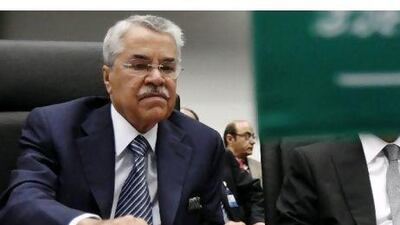VIENNA // Before its meetings Opec gives reporters a guide with a page devoted to each of the men who decide the fate of nearly half of the world's oil supply. Lines upon lines of text detail the oil ministers' career histories, university degrees and how many children they have.
Energy The latest energy news from The National
Last Updated: June 12, 2011
Opec split leaves Saudi to go it alone Opec's member states are at odds as pressure from the West to raise oil output continues to rise. Read article
For Opec, a painful path to establishing consensus Alirio Parra, former Venezuela oil minister and Opec president, helped steer the organisation towards consensus even as members states waged war against each other. Read article
Investors hope for international pointers Regional investors this week will be eyeing chatter on quantitive easing by the US Federal Reserve and watching oil prices closely to determine market moves. Read article
But last week some negotiators seemed to arrive in Austria with no past at all. Opec staff had only enough notice from Iran and Libya to paste in mugshots and names, leaving the rest of the page starkly blank - a testament to the uncertainty in those member states and the Opec alliance itself.
Last Wednesday the organisation's leaders failed to reach a consensus on crude output targets for the first time in more than a decade. Officials emerging from the fractious six-hour negotiations did not appear even to agree on the date of their next meeting. The powerful group that has held sway over the world economy for half a century had, as one former Opec official put it, "abdicated" its role.
"The whole [group] now looks fragmented, and it affects its global credibility if it looks like there is a rift and member states are doing their own thing," said Caroline Bain, a senior commodities specialist at the Economist Intelligence Unit in London. "At the moment, it seems difficult to see how to restore the credibility of Opec."
Saudi Arabia is now likely to go it alone in an output increase in defiance of its Opec quota. On Friday, Al Hayat newspaper reported that the kingdom planned to move production from today's levels of about 9 million barrels a day (bpd) to 10 million bpd next month. The fracture between Saudi Arabia and the Iran-led Opec members is being widened by pressure from the US and Europe, Ms Bain said.
"They have the West battering on their door saying increase output," she said. "They're being forced to raise output unilaterally."
Bringing back the organisation's clout is important not only to Opec, as Brent crude, the European benchmark, flirts with US$120 a barrel, a level that many agree can hinder the global economic recovery. Opec's in-house economists warned on Friday that sustained high prices could wipe away 200,000 bpd of demand from the market.
Meanwhile the International Energy Agency, the organisation based in Paris that represents the interests of 28 oil-importing industrialised nations, has again threatened "to help ensure that markets are well supplied", implying it could reach into its own emergency stockpile.
"The high price is very bad for the world economy, and until now the world economy is not strong enough," said Sheikh Ahmed Zaki Yamani, who served as Saudi oil minister for 25 years. "The problem with some Opec members is they want a high price of oil and high production, and this cannot happen all the time."
The tensions preventing consensus are part political, part economic. Production increases advocated by Saudi Arabia are opposed by countries that are already pumping at maximum capacity. Meanwhile, a protracted civil war in Libya, where Qatar and the UAE are aiding the forces rebelling against the regime of Muammar Qaddafi, and tensions between the Opec powerhouses Saudi Arabia and Iran have pitted some nations against each other.
Analysts predict the Opec nations will not act as harmoniously as in the past decade but the organisation will remain intact.
"People aren't used to it, because we've had a very long period of stability in Opec when people were business-minded. When it came to the oil industry, pretty much everyone pulled up behind Saudi Arabia," said Samuel Ciszuk, a regional analyst at IHS in London, marking 1999 as the beginning of that period.
"Before that everybody was just overproducing and cheating and oil prices were very low. The Saudi oil minister, [Ali] al Naimi, was very instrumental in pulling everyone together and saying enough cheating, let's stick to our quotas and rein in supply and lift prices.
"It's never been an organisation that drives member countries, it's been the member countries that drive the organisation."
Power struggles inside Opec will have less of an impact on the organisation's lifespan than advances in renewable energy technology, said Sheikh Yamani, who now heads the Centre for Global Energy Studies, a think tank in London.
"As long as the need for Opec's oil is there, Opec will continue," he said. "When you have alternative sources of energy, this will be the end of Opec. But this is way in the future, not now. What makes it happen sooner is the high price of oil."

